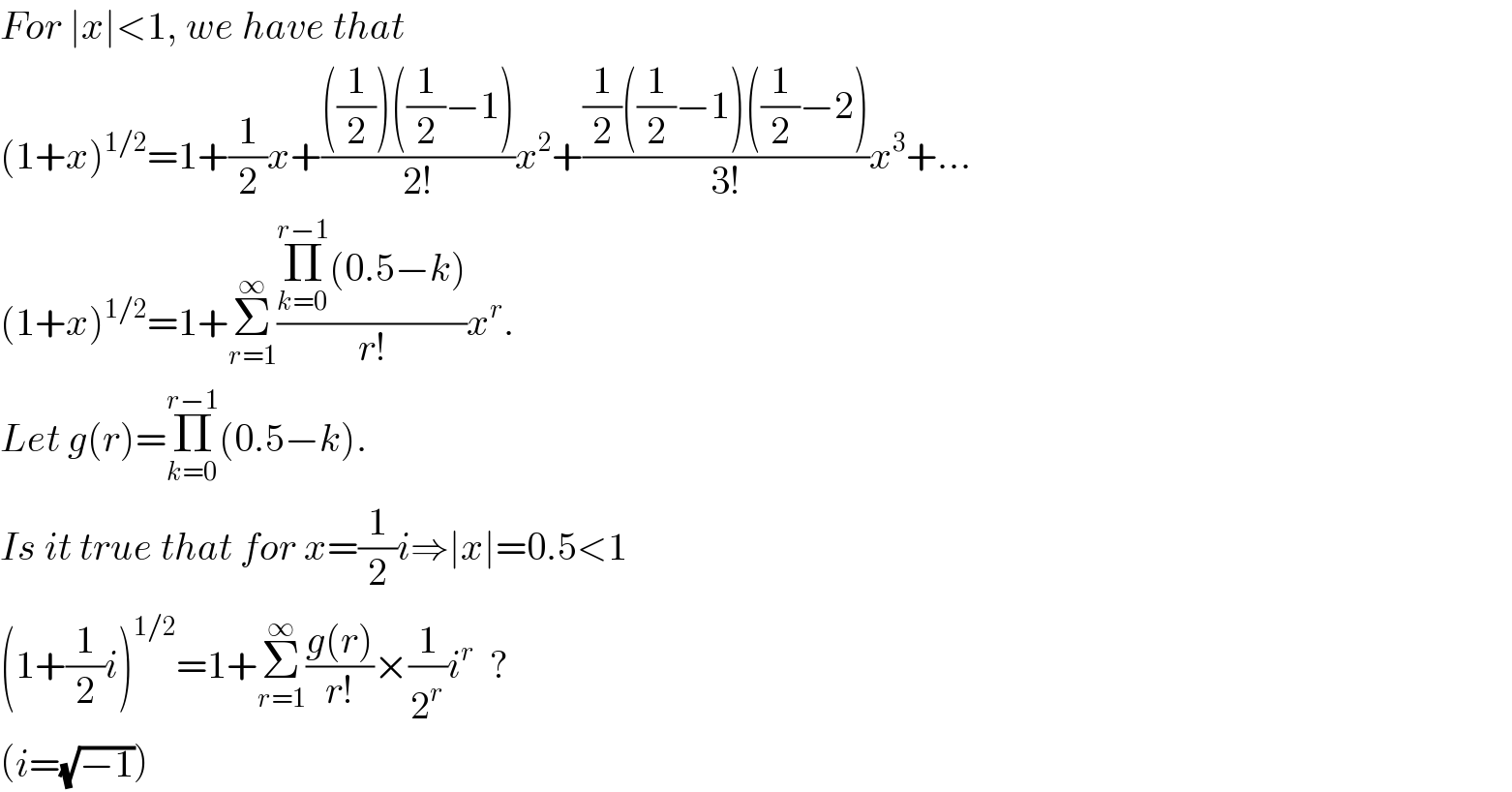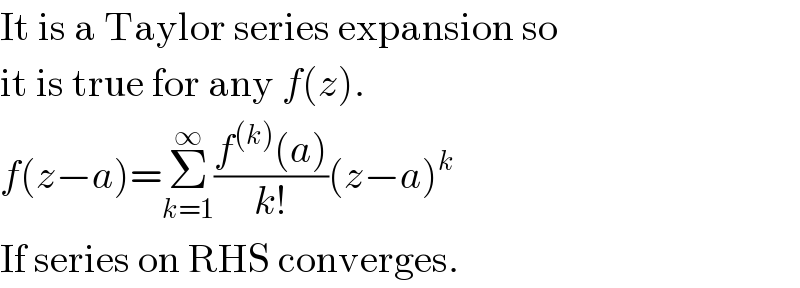
Question Number 8127 by Yozzia last updated on 30/Sep/16

$${For}\:\mid{x}\mid<\mathrm{1},\:{we}\:{have}\:{that} \\ $$ $$\left(\mathrm{1}+{x}\right)^{\mathrm{1}/\mathrm{2}} =\mathrm{1}+\frac{\mathrm{1}}{\mathrm{2}}{x}+\frac{\left(\frac{\mathrm{1}}{\mathrm{2}}\right)\left(\frac{\mathrm{1}}{\mathrm{2}}−\mathrm{1}\right)}{\mathrm{2}!}{x}^{\mathrm{2}} +\frac{\frac{\mathrm{1}}{\mathrm{2}}\left(\frac{\mathrm{1}}{\mathrm{2}}−\mathrm{1}\right)\left(\frac{\mathrm{1}}{\mathrm{2}}−\mathrm{2}\right)}{\mathrm{3}!}{x}^{\mathrm{3}} +... \\ $$ $$\left(\mathrm{1}+{x}\right)^{\mathrm{1}/\mathrm{2}} =\mathrm{1}+\underset{{r}=\mathrm{1}} {\overset{\infty} {\sum}}\frac{\underset{{k}=\mathrm{0}} {\overset{{r}−\mathrm{1}} {\prod}}\left(\mathrm{0}.\mathrm{5}−{k}\right)}{{r}!}{x}^{{r}} . \\ $$ $${Let}\:{g}\left({r}\right)=\underset{{k}=\mathrm{0}} {\overset{{r}−\mathrm{1}} {\prod}}\left(\mathrm{0}.\mathrm{5}−{k}\right). \\ $$ $${Is}\:{it}\:{true}\:{that}\:{for}\:{x}=\frac{\mathrm{1}}{\mathrm{2}}{i}\Rightarrow\mid{x}\mid=\mathrm{0}.\mathrm{5}<\mathrm{1} \\ $$ $$\left(\mathrm{1}+\frac{\mathrm{1}}{\mathrm{2}}{i}\right)^{\mathrm{1}/\mathrm{2}} =\mathrm{1}+\underset{{r}=\mathrm{1}} {\overset{\infty} {\sum}}\frac{{g}\left({r}\right)}{{r}!}×\frac{\mathrm{1}}{\mathrm{2}^{{r}} }{i}^{{r}} \:\:? \\ $$ $$\left({i}=\sqrt{−\mathrm{1}}\right) \\ $$
Commented byprakash jain last updated on 01/Oct/16

$$\mathrm{It}\:\mathrm{is}\:\mathrm{a}\:\mathrm{Taylor}\:\mathrm{series}\:\mathrm{expansion}\:\mathrm{so} \\ $$ $$\mathrm{it}\:\mathrm{is}\:\mathrm{true}\:\mathrm{for}\:\mathrm{any}\:{f}\left({z}\right). \\ $$ $${f}\left({z}−{a}\right)=\underset{{k}=\mathrm{1}} {\overset{\infty} {\sum}}\frac{{f}^{\left({k}\right)} \left({a}\right)}{{k}!}\left({z}−{a}\right)^{{k}} \\ $$ $$\mathrm{If}\:\mathrm{series}\:\mathrm{on}\:\mathrm{RHS}\:\mathrm{converges}. \\ $$
Commented byprakash jain last updated on 01/Oct/16

$${f}\left({z}\right)=\underset{{n}=\mathrm{0}} {\overset{\infty} {\sum}}{c}_{{n}} \left({z}−{a}\right)^{{n}} \\ $$ $${from}\:{ratio}\:{test} \\ $$ $$\underset{{n}\rightarrow\infty} {\mathrm{lim}}\mid\frac{{c}_{{n}+\mathrm{1}} \left({z}−{a}\right)}{{c}_{{n}} }\mid<\mathrm{1} \\ $$ $$\mathrm{or}\:\mid{z}−{a}\mid<\underset{{n}\rightarrow\infty} {\mathrm{lim}}\mid\frac{{c}_{{n}} }{{c}_{{n}+\mathrm{1}} }\mid \\ $$ $$\mathrm{for}\:\left(\mathrm{1}+{z}\right)^{{y}} \:\left({a}=\mathrm{0}\right) \\ $$ $${c}_{{n}} =\frac{{y}\left({y}−\mathrm{1}\right)...\left({y}−{n}+\mathrm{1}\right)}{{n}!} \\ $$ $${c}_{{n}+\mathrm{1}} =\frac{{y}\left({y}−\mathrm{1}\right)...\left({y}−{n}+\mathrm{1}\right)\left({y}−{n}\right)}{\left({n}+\mathrm{1}\right)!} \\ $$ $$\frac{{c}_{{n}} }{{c}_{{n}+\mathrm{1}} }=\frac{{n}+\mathrm{1}}{{y}−{n}} \\ $$ $$\underset{{n}\rightarrow\infty} {\mathrm{lim}}\:\mid\frac{{c}_{{n}} }{{c}_{{n}+\mathrm{1}} }\mid=\mathrm{1} \\ $$ $${so}\:{the}\:{series}\:{converges}\:{if}\:\mid{z}\mid<\mathrm{1} \\ $$ $$\mathrm{so}\:\mathrm{the}\:\mathrm{series}\:\mathrm{expansion}\:\mathrm{of}\:\left(\mathrm{1}+\frac{{i}}{\mathrm{2}}\right)^{\mathrm{1}/\mathrm{2}} \\ $$ $$\mathrm{is}\:\mathrm{correct}. \\ $$
Commented byYozzias last updated on 01/Oct/16

$${Thanks}!\:{When}\:{would}\:{convergence} \\ $$ $${occur}? \\ $$
Answered by prakash jain last updated on 02/Oct/16

$$\mathrm{answer}\:\mathrm{in}\:\mathrm{comments} \\ $$
